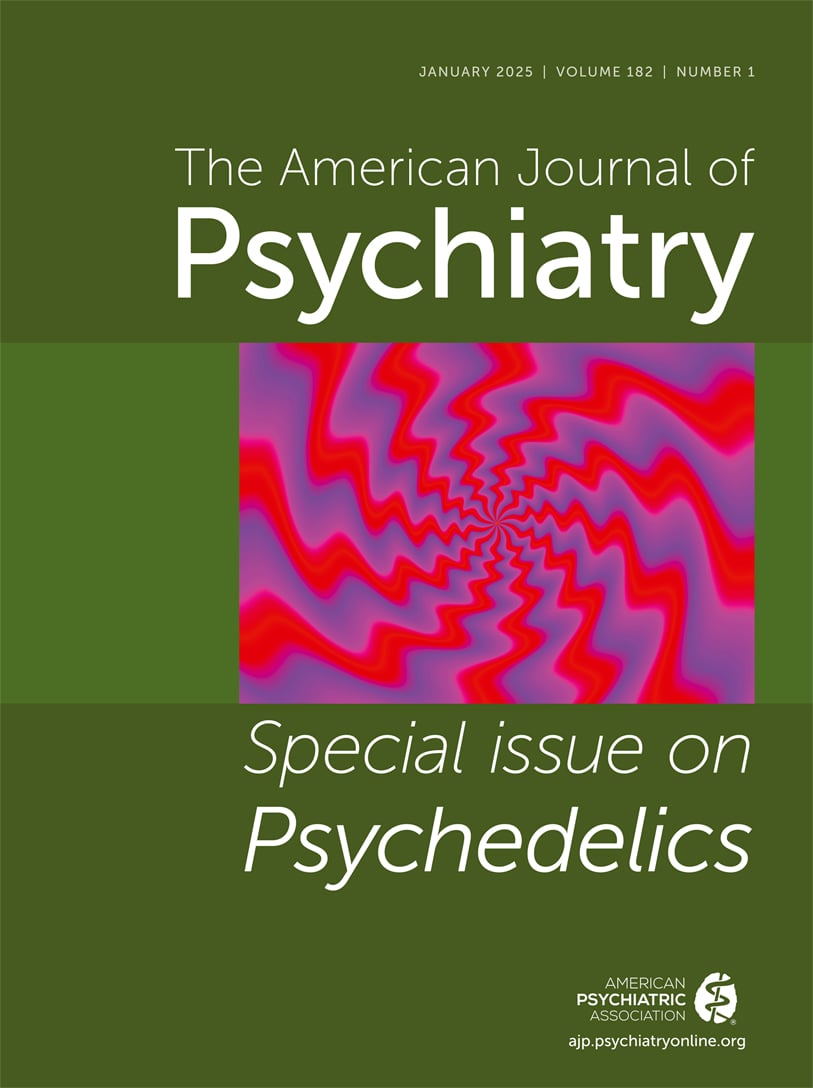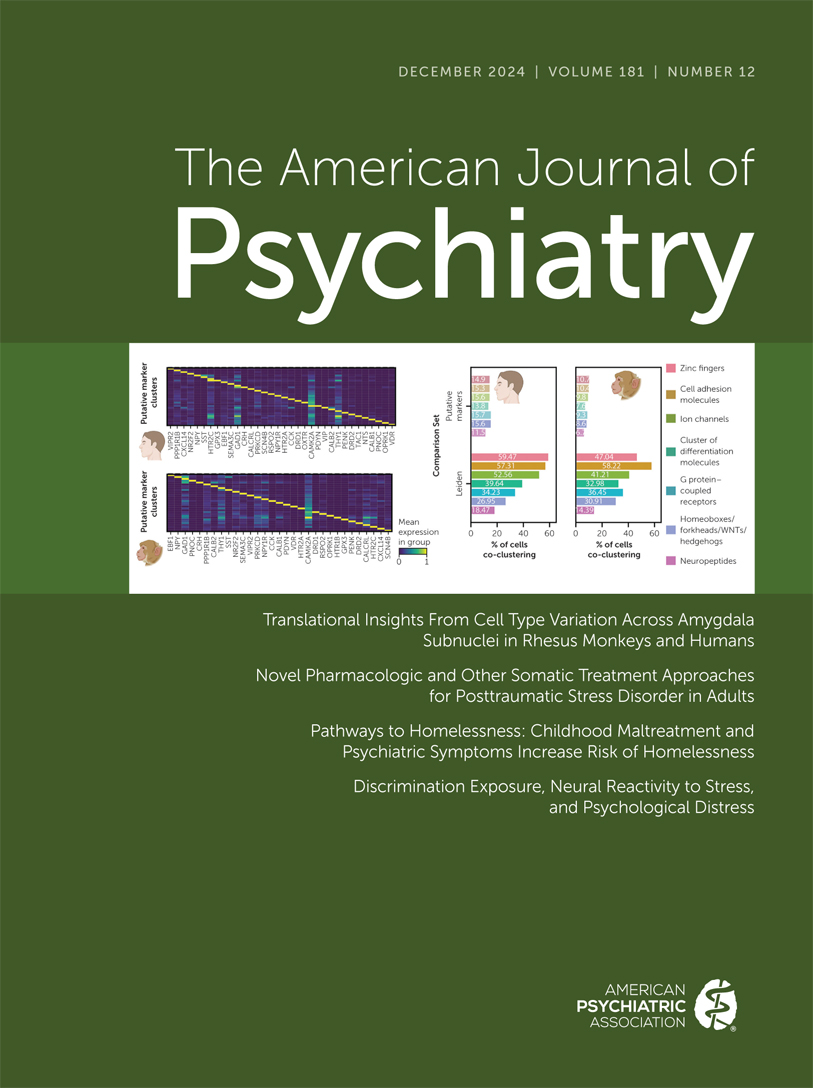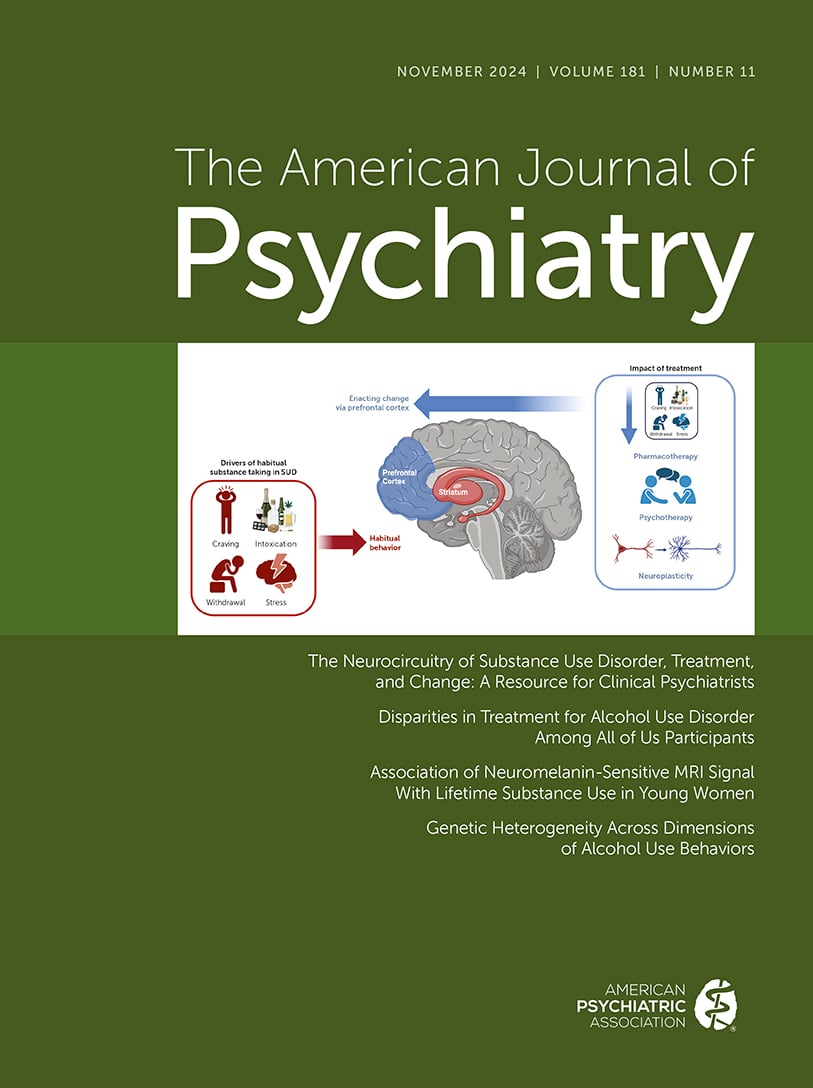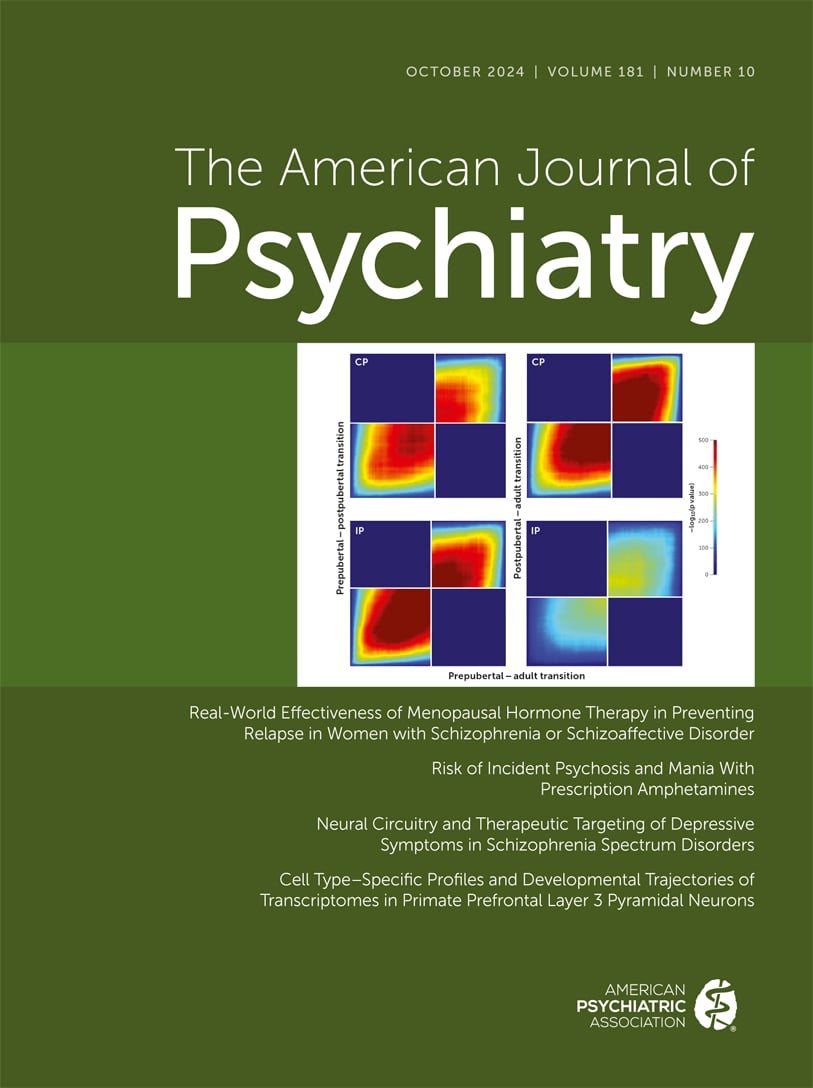American Journal of Psychiatry
- Volume 162
- Number 6
- June 2005
In This Issue
Editorial
Reviews and Overviews
Publication date: 01 June 2005
Pages1045–1056OBJECTIVE: Mortality risk in offspring of parents with psychotic disorders is a sensitive and important topic, but evidence on which to base plans for preventive services is limited. The authors synthesized evidence for mortality risk among offspring of ...
https://doi.org/10.1176/appi.ajp.162.6.1045Images in Neuroscience
Introspections
Clinical Case Conference
Images in Psychiatry
Article
Publication date: 01 June 2005
Pages1067–1075OBJECTIVE: Patients with attention deficit hyperactivity disorder (ADHD) and a medication history have shown abnormal brain activation in prefrontal and striatal brain regions during cognitive challenge. Previous findings have been confounded, however, by ...
https://doi.org/10.1176/appi.ajp.162.6.1067Publication date: 01 June 2005
Pages1076–1082OBJECTIVE: The authors sought to determine whether nonaffected siblings of ADHD probands have a motor response inhibition deficit and to assess concordance for this inhibition deficit in ADHD-concordant and ADHD-discordant sibling pairs. METHOD: ADHD-...
https://doi.org/10.1176/appi.ajp.162.6.1076Publication date: 01 June 2005
Pages1083–1089OBJECTIVE: In a previous study, the authors found that, compared with referred boys with attention deficit hyperactivity disorder (ADHD), girls are less likely to manifest comorbid disruptive behavior disorders and learning disabilities—characteristics ...
https://doi.org/10.1176/appi.ajp.162.6.1083Publication date: 01 June 2005
Pages1090–1099OBJECTIVE: The 22q11 deletion syndrome is associated with a range of possible physical anomalies, probable ongoing learning disabilities, and a specific constellation of neuropsychological deficits, including impairments in selective and executive visual ...
https://doi.org/10.1176/appi.ajp.162.6.1090Publication date: 01 June 2005
Pages1100–1107OBJECTIVE: Boys with conduct disorder are at risk of persistently showing antisocial behavior in adult life, particularly if they have an additional diagnosis of attention deficit hyperactivity disorder (ADHD). In the search for biological risk factors ...
https://doi.org/10.1176/appi.ajp.162.6.1100Publication date: 01 June 2005
Pages1108–1117OBJECTIVE: This longitudinal study of a nonreferred, population-based sample tested the concurrent, convergent, and predictive validity of DSM-IV conduct disorder in children 4½–5 years of age. METHOD: In the Environmental Risk Longitudinal Twin Study, a ...
https://doi.org/10.1176/appi.ajp.162.6.1108Publication date: 01 June 2005
Pages1118–1124OBJECTIVE: The authors investigated whether the association between adolescent problem behavior and adult substance use and mental health disorders was general, such that adolescent problem behavior elevates the risk for a variety of adult disorders, or ...
https://doi.org/10.1176/appi.ajp.162.6.1118Publication date: 01 June 2005
Pages1125–1132OBJECTIVE: The purpose of the study was to examine adaptive, emotional, and family functioning in a well-characterized group of children and adolescents with obsessive-compulsive disorder (OCD) and to evaluate the influence of comorbid attention deficit ...
https://doi.org/10.1176/appi.ajp.162.6.1125Publication date: 01 June 2005
Pages1133–1141OBJECTIVE: The rate of reported pervasive developmental disorders has increased, and the authors found a rate of 62.6 per 10,000 in a previous study of preschoolers in Stafford, U.K. They conducted another survey in 2002 to estimate the prevalence in ...
https://doi.org/10.1176/appi.ajp.162.6.1133Publication date: 01 June 2005
Pages1142–1148OBJECTIVE: Risperidone has been found efficacious for decreasing severe tantrums, aggression, and self-injurious behavior in children and adolescents with autistic disorder (autism). The authors report on whether risperidone improves the core symptoms of ...
https://doi.org/10.1176/appi.ajp.162.6.1142Publication date: 01 June 2005
Pages1149–1157OBJECTIVE: Quality improvement programs for depression can improve outcomes, but the utility of including patients with subthreshold depression in quality improvement programs is unclear. The authors examined 57-month effects of quality improvement on ...
https://doi.org/10.1176/appi.ajp.162.6.1149Publication date: 01 June 2005
Pages1158–1164OBJECTIVE: The aim of this investigation was to compare the efficacy of computer-assisted cognitive therapy against standard cognitive therapy and a control group without treatment for outpatients with nonpsychotic major depressive disorder. METHOD: ...
https://doi.org/10.1176/appi.ajp.162.6.1158Publication date: 01 June 2005
Pages1165–1170OBJECTIVE: In a platelet/endothelial biomarker substudy of the Sertraline AntiDepressant Heart Attack Randomized Trial (SADHART), the authors sought to determine whether plasma levels of sertraline and its primary metabolite N-desmethylsertraline affect ...
https://doi.org/10.1176/appi.ajp.162.6.1165Publication date: 01 June 2005
Pages1171–1178OBJECTIVE: Previous reports demonstrating quality-of-life impairment in anxiety and affective disorders have relied upon epidemiological samples or relatively small clinical studies. Administration of the same quality-of-life scale, the Quality of Life ...
https://doi.org/10.1176/appi.ajp.162.6.1171Publication date: 01 June 2005
Pages1179–1187OBJECTIVE: The authors sought to observe the long-term clinical course of anxiety disorders over 12 years and to examine the influence of comorbid psychiatric disorders on recovery from or recurrence of panic disorder, generalized anxiety disorder, and ...
https://doi.org/10.1176/appi.ajp.162.6.1179Publication date: 01 June 2005
Pages1188–1191OBJECTIVE: This study evaluated the prevalence of posttraumatic stress disorder (PTSD) and the longitudinal course of early PTSD symptoms in survivors of terrorist attacks. It additionally assessed the effect of continuous terrorism on the course of early ...
https://doi.org/10.1176/appi.ajp.162.6.1188Publication date: 01 June 2005
Pages1192–1199OBJECTIVE: The authors compared responses of female domestic violence survivors and a matched group of nontraumatized participants to a low-dose (0.5 mg) dexamethasone suppression test (DST). METHOD: Seventy female domestic violence survivors and 14 ...
https://doi.org/10.1176/appi.ajp.162.6.1192Brief Report
Publication date: 01 June 2005
Pages1200–1202OBJECTIVE: In a previous study the authors found that dendritic spine density was reduced on prefrontal pyramidal neurons in layer 3 of subjects with schizophrenia. From a neural circuitry perspective, understanding the pathophysiological significance of ...
https://doi.org/10.1176/appi.ajp.162.6.1200Publication date: 01 June 2005
Pages1203–1205OBJECTIVE: Postmortem and structural imaging studies suggest that patients with schizophrenia have disrupted cerebellar activity. It has been speculated that these abnormalities mediate disorganized thought processes and psychosis. The authors’ goal was ...
https://doi.org/10.1176/appi.ajp.162.6.1203Publication date: 01 June 2005
Pages1206–1208OBJECTIVE: This study investigated changes in the cognitive architecture of N-back performance in schizophrenia. METHOD: N-back performance of 12 patients with first-episode, drug-naive schizophrenia and matched healthy comparison subjects was studied in ...
https://doi.org/10.1176/appi.ajp.162.6.1206Publication date: 01 June 2005
Pages1209–1211OBJECTIVE: The authors’ goal was to determine whether people with schizophrenia experience changes in decisional capacity when their antipsychotic regimens are discontinued for research purposes. METHOD: Capacity for informed consent for research, ...
https://doi.org/10.1176/appi.ajp.162.6.1209Publication date: 01 June 2005
Pages1211–1213OBJECTIVE: This study sought to investigate neural activity in the amygdala during episodes of mania. METHOD: Nine manic subjects and nine healthy comparison subjects underwent functional magnetic resonance imaging (fMRI) while performing a ...
https://doi.org/10.1176/appi.ajp.162.6.1211Publication date: 01 June 2005
Pages1214–1216OBJECTIVE: Although there has recently been increased interest in child mania, there is as yet no brief screening tool that separates a prepubertal and early adolescent bipolar disorder phenotype from attention deficit hyperactivity disorder (ADHD), the ...
https://doi.org/10.1176/appi.ajp.162.6.1214Publication date: 01 June 2005
Pages1217–1221OBJECTIVE: Despite concerns about the adverse effects of second-generation antipsychotics on weight regulation and glucose and lipid metabolism, little is known about the relationship between these agents and the metabolic syndrome. Because the metabolic ...
https://doi.org/10.1176/appi.ajp.162.6.1217Publication date: 01 June 2005
Pages1221–1224OBJECTIVE: The aim of this study was to determine the efficacy and safety of dialectical behavior therapy plus olanzapine compared with dialectical behavior therapy plus placebo in patients with borderline personality disorder. METHOD: Sixty patients with ...
https://doi.org/10.1176/appi.ajp.162.6.1221Letter to the Editor
Book Forum: Childhood and Adolescence Issues
Book Forum: Textbooks and Handbooks
Book Forum: Neuropsychology, Neuroscience, and Psychiatry
Book Forum: Cross-Cultural Psychiatry
Past Issues
View Issues Archive
Vol. 182 | No. 1

Vol. 181 | No. 12

Vol. 181 | No. 11
